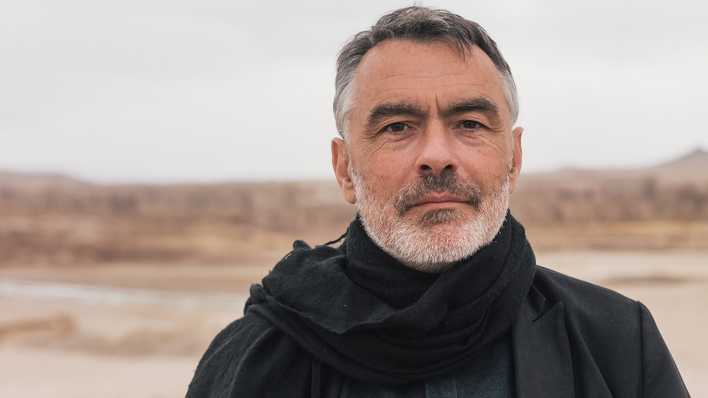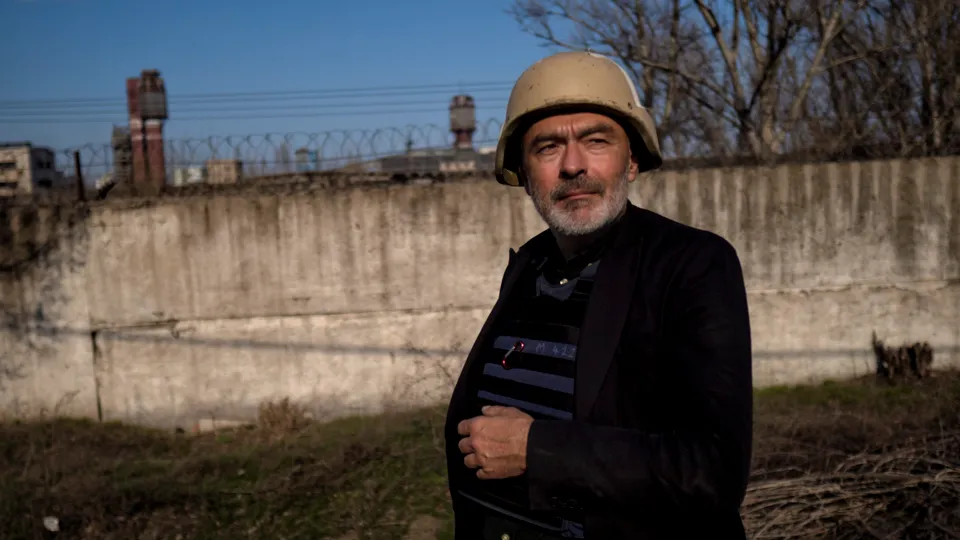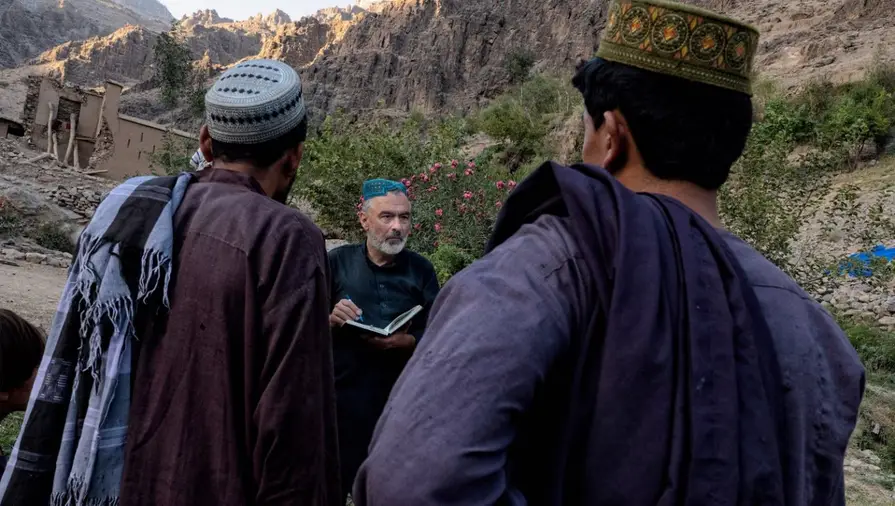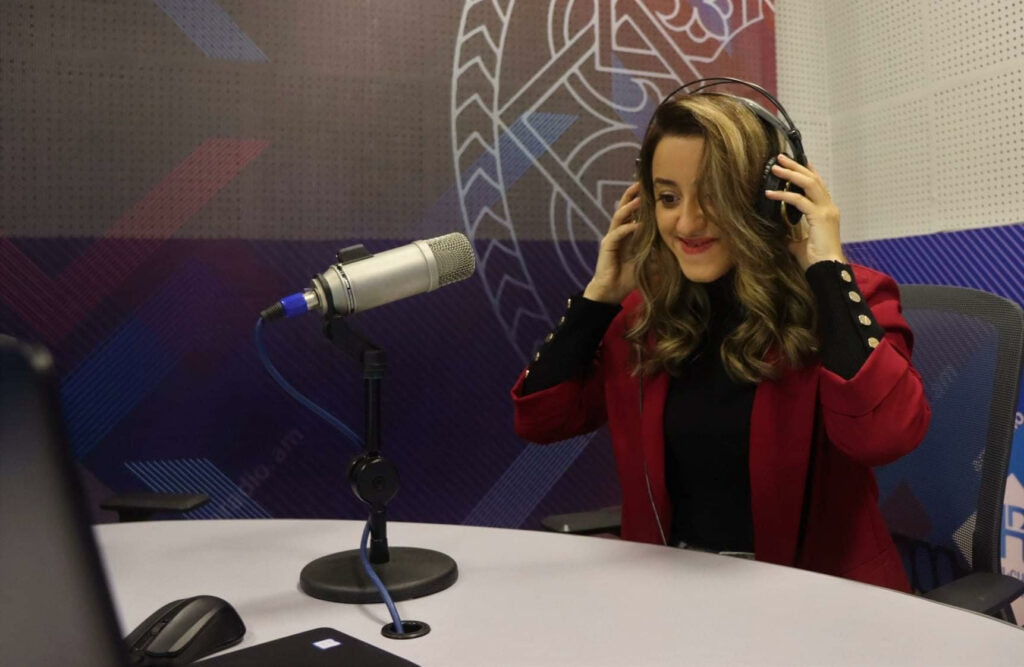by Nane Petrosyan
Christoph Reuter is an esteemed reporter known for his extensive coverage of crisis regions within the Islamic world, particularly Syria, during his tenure in the foreign department at DER SPIEGEL. With a career spanning decades, Reuter has provided invaluable insights into complex geopolitical situations, leveraging his profound understanding of the region’s dynamics and his fluency in Arabic.
As a trained Islamic scholar, Reuter brings a unique perspective to his reporting. His contributions include multiple award-winning reports and books such as “The Black Power” (2015), an insightful exploration into the workings of the “Islamic State.” Additionally, his previous works, including “My Life is a Weapon” (2002) and “Café Bagdad” (2004), have offered poignant narratives on topics ranging from suicide bombers to everyday life in embattled Iraq.
In this interview, we delve into Christoph Reuter’s extensive experience in crisis journalism, aiming to gain insights into critical issues.

For journalists aspiring to become war correspondents, what procedure or training is recommended? Is there a defined method to follow before being considered prepared for this challenging role?
You should first of all be a good reporter. You should not think that reporting from a war zone excuses any shortcomings in quality as the subject itself is so interesting. You should simply be a good reporter and a good investigator. You report, check, you search for the small things this way. For instance, in areas liberated from Russian occupation, it’s about identifying signs of looting, understanding the impact on the people, and gathering tangible evidence. Before venturing into war reporting, you have to start somewhere. The crucial point is understanding your reactions in dangerous situations where you have never been. Whether you’ll panic or stay composed is something you’ll only discover in the moment. So, it’s better to not go to the worst frontline, but rather to start at the periphery of conflict zones to check your reactions. Engaging with individuals who have fled from the distress of places like Nagorno-Karabakh allows you to test your emotional response. See if you can withstand situations when people shout at you, when they are injured, when they have seen extreme misery. Assessing if you feel discomfort, experience post-traumatic stress, or have physical reactions like fainting or vomiting is essential. For example, you might consider participating in a medical emergency scenario for a weekend to gauge your reaction to seeing someone in pain or heavily bleeding. All kinds of reactions are possible. You have to know yourself under such stress.
But do you find it necessary to have specific knowledge, such as military expertise or first aid skills, before engaging in such experiences? Or is this something you acquire through the actual experience itself?
No, but you can do a first aid course tailored for war zones. Research online for the necessary skills and equipment, and consider training with a tourniquet. Seek out groups offering combat training for volunteers in places like Ukraine, Armenia, or Lithuania. Ask them whether you can spend a training weekend with them or when their courses are held. The goal is not to wield a weapon as a journalist, but to understand how it works, to learn how to differentiate the sound of incoming and outgoing artillery and understand where to seek cover in various scenarios, basically, treating this preparation like research for a story; any medical or outdoor military training can provide essential skills on how to move, react, and treat people in such challenging situations.
Are there specific organizations that offer courses like this, or is it more about self-organizing and determining what skills you need before seeking training opportunities?
There are differences. There’s one easy thing: it’s the technical preparation, the items we should have in our luggage. What essentials would you need if you entered a war zone? Maybe a flak jacket, maybe a helmet, definitely a compass, a tourniquet for catastrophic bleeding, bandages, painkillers for emergencies. The complicated part lies in preparing yourself to cope with extreme stress without panicking. If these situations overwhelm you, causing fainting or distress at the sight of blood, frontline reporting might not be suitable. But if you can handle these scenarios, if you feel good, then it’s ok.
Was there a moment when you realized you could handle this work? I mean, when you understood you were able to work in such environments without panicking.
Yes, but it was a slow process. During the fall of Baghdad and Tikrit in Iraq in 2003, I found myself in the midst of the last military confrontations. We had people severely injured running towards our car, and people in panic, and I noticed l could stay calm and decide what to do, while nearly kidnapped, I kind of froze. I remained very calm and told the other guy “don’t take out your money, don’t panic, just let’s wait, that’s the best thing to do now.” This experience gave me confidence – I can go to heavier war situations, and I will still remain calm.

What are some common errors or missteps made by journalists that result in fatalities during reporting?
It’s a mixture. We analyze the circumstances of others’ deaths in the areas we report from. We scrutinize their actions, asking ourselves if there was anything we would have avoided. It’s somewhat of a relief when we spot a mistake we would not have done. But also you have many cases where he did exactly what we did — just being in the area, driving, talking to people, not lingering too long. In conflict zones like Ukraine, with frequent gunfire and artillery, you can simply be unlucky. We were at a well-known pizzeria in Kramatorsk which was then hit by a Russian missile, and one colleague’s friend died there. It could have been any of us. Suddenly, they hit this pizzeria. Yes, it may hit you as well, you may be unlucky, and this is why we do this weird thing, examining the causes of our colleagues’ deaths — where they went, what they did. You have no idea what to expect over the next 100 meters. Was there anything we would have avoided, like crossing the frontlines in an area devoid of people or in an extremely risky area for kidnapping, getting out of the car and speaking for half an hour in a foreign language through your headphones (just because you have a good signal on some sort of a hill), making yourself easily identifiable as a foreigner to everyone around? Subsequently, this person gets kidnapped. Avoid mistakes, but for the rest, reporting from such regions is riskier than covering domestic news.
Are there any international organizations using these incidents as case studies to establish protocols or guidelines?
No, because criticizing colleagues who have died is a complicated issue. It’s more internal, involving those responsible for journalists’ safety and those conducting hostile environment training among fellow journalists. Around Bakhmut we were perhaps 30-40 journalists, most of whom knew each other from previous encounters in Kyiv, Kabul, Libya. Not so many do this. We would share insights, like what actions were taken before an incident, analyzing whether it was simply bad luck or something overlooked that could happen to anyone. For instance, standing too close to an artillery cannon and getting hit. While we identify such instances ourselves, there isn’t an organized international body doing this.
Yes, but I believe it could be a means of preventing similar incidents rather than criticizing.
Yes, but the problem is that when discussing incidents, for example, in Bakhmut and revealing specific details, everybody will know who we are talking about. Making it public poses moral and ethical dilemmas when scrutinizing actions of those who have passed away. Probably, that person died because he or she made a mistake. So, it’s more like in hostile environment courses, which people should do. Lessons on movement, actions, and precautions should be a part of the curriculum. However, by openly referencing these incidents you come very close to criticizing a particular person.

What is the core mission of a war reporter? Is it solely the dissemination of information to the public, or does it extend to emotive storytelling capable of significant impact? Or maybe it depends on editorial policies?
No, both. I mean the war, the killing of people inflict enormous pain on humans. It’s something self-explaining, so what happened should be reported but equally significant, in my view, is that you have a massacre, you have people killed, you have something that happened, and two sides blaming each other, blaming someone different. So, a meticulous research should be conducted. The essence lies in examining what truly occurred to find out who is telling the truth and who is lying.
And this is something. This is not self-explaining, but it’s crucial to determine what happened. Take, for instance, MH-17, the jet downed by a Russian Buk missile system over Eastern Ukraine en route from Schiphol Amsterdam to Kuala Lumpur, Malaysia. Moscow claims it was the Ukrainians responsible for the downing, a blatant lie that led to the deaths of 300 people. It’s essential to unveil the truth behind such incidents.
How many people are there in your team?
Normally, we are at least 3: a local, fluent in the language and handling communication, a photographer and myself as the reporter. Sometimes, we might have a second fixer or researcher with local knowledge, especially in high risk areas. There were instances in Afghanistan where our team expanded due to a car breakdown, so we had to hire another car with a new driver. But we couldn’t leave behind the driver for days in some village, so we would take everybody with us and ended up being around 7 people, requiring a bus to transport everyone (laughs) to their respective cars and various repair shops. But normally we are 3 persons.
Suppose there’s an incident like Azerbaijan attacking Armenia — how do you plan your work in such a scenario? What’s your approach when you first hear about it and decide to cover the situation?
I would try to arrange it with people I know, since I don’t speak Armenian or Russian. I could join one of their teams as they would cover the same thing. I need, in addition, a translator on hand, so I have a constant translation of what is happening. Another aspect is the usual equipment that we should bring with us. Ensure contingency plans for worst-case scenarios, such as the conflict reaching Yerevan and potential airport closures. What alternative exits or evacuation routes are available if leaving the country becomes necessary? But the most important thing is having experienced contacts with whom you can move near the frontline, who, for example, know what kind of drones the Azerbaijani army is using, how to avoid unforeseen risks in an unfamiliar environment.
In the end, I’d like to discuss the terms of your contract with the editor. Could you share what it involves? Is life insurance part of it?
Yes, we should have life and medical insurance. If something happens, we would be evacuated by plane, if possible. Also, I would discuss one point with the editors once we’re on-site, for instance, in Armenia during another Azerbaijani attack: while our initial plan is to join a specific unit, decisions about our movements in the area, such as when to return or wait, remain my responsibility. It’s crucial that these decisions aren’t dictated remotely from a desk 4000 km away, as they lack information. And excessive movement could potentially put us in danger. The decision-making power should rest with those on-site.
This article was published within the frames of “Correspondents in Conflict” Project,
implemented by Yerevan Press Club and Deutsche Gesellschaft e. V. The Project is
funded by the German Federal Foreign Office within the “Eastern Partnership Program”.
The contents of this article are the sole responsibility of the implementing partners and can in
no way be taken to reflect the views of the Federal Foreign Office. #civilsocietycooperation
 Nane Petrosyan is a journalist based in Yerevan, Armenia. She graduated from Yerevan State University’s Faculty of Journalism. For the past year, she has been actively contributing to the news section of Armenian Public Radio. Her work mainly revolves around regional issues, including the Nagorno-Karabakh conflict.
Nane Petrosyan is a journalist based in Yerevan, Armenia. She graduated from Yerevan State University’s Faculty of Journalism. For the past year, she has been actively contributing to the news section of Armenian Public Radio. Her work mainly revolves around regional issues, including the Nagorno-Karabakh conflict.












